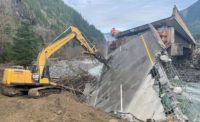In the wake of Typhoon Doksuri striking northern China in June and July, record rain has inundated Hebei Province and Beijing, with floods washing away bridges and highways among other substantial damage to infrastructure.
A 100-m-long bridge collapsed in Hubei province as did an expressway bridge in Heilongjiang province, sending two cars into the water, media outlets report. “The engineering behind Chinese bridges is very weak,” said one India-based project manager
No official damage cost or detail has yet been released, but China’s government said it has allocated $124 million for immediate post-disaster relief and reconstruction in stricken regions.
Infrastructure in the Hai River basin, a system stretching across 265,000 sq km, faces particular challenges.
Rain has eased, but scores of reservoirs have been diverted to trap floodwater flowing downstream. With China’s capital Beijing recording the heaviest rainfall in the 140 years since official recordkeeping began, floodwaters were diverted from the city to Zhuozhou, which has borne the brunt of the damage.
While Beijing has also been building a drainage system to divert floodwaters to rivers in rural areas, the airfield of four-year-old Beijing Daxing International Airport was inundated, leaving aircraft stranded in the water.
“While Shanghai is a well-planned city with excellent tunnelling using German-technology pumping systems to drain sewage and water, drainage has been neglected in cities like Beijing,” Abhijit Das, general manager of Mumbai-based contractor ACE Group, told ENR.
China's Ministry of Housing and Urban-Rural Development has said it dispatched to Zhuozhou four sets of large-scale emergency drainage units with a total capacity of 12,000 cubic m per hour, giving priority to hospitals, power substations and heavily flooded large residential areas.
Non-governmental groups such as the International Federation of Red Cross and Red Crescent Societies and the World Health Organization have been working with the Chinese government and local authorities to provide immediate response and prevent disease outbreaks, but the country has not reached beyond its borders for major reconstruction assistance, sources say.
China President Xi Jinping said the country will restore the damaged infrastructure.




